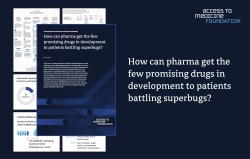Date
24 May 2024
India’s battle against antimicrobial resistance hit by delays in drug approvals
Direct links
While India has made significant strides in advancing public health in the past two decades, it still faces some of the highest rates of antibiotic resistance globally.
Borrowing insights from the Foundation’s new report, the article focuses on the current lack of access planning for the few promising new antimicrobial drugs that are currently in the pipeline to be distributed in LMICs, which could leave people living in those countries, especially India, vulnerable to drug-resistant infections.
The article pulls out the following example from the report. Antibiotics like gepotidacin, which GSK is currently developing for both adults and children, show promise due to their success in clinical trials for treating uncomplicated urinary tract infections. However, it is unclear in which LMICs GSK plans to register the drug upon initial approval.
The article points out that the lack of structured access plans for new antimicrobial drugs could mean people living in India and other LMICs will not receive essential medicines promptly enough. The culmination of these delays “could result in a public health crisis for India, where drug-resistant infections are rapidly escalating.”
Tackling the sheer scale and pace of drug resistance is a complex global health issue that will require action from pharmaceutical companies across several areas. This includes providing appropriate access and implementing stewardship measures to safeguard the effectiveness of innovative antimicrobials. Failure to do this will limit efforts to tackle drug resistance.
Marijn Verhoef, Director of Operations and Research, Access to Medicine Foundation
